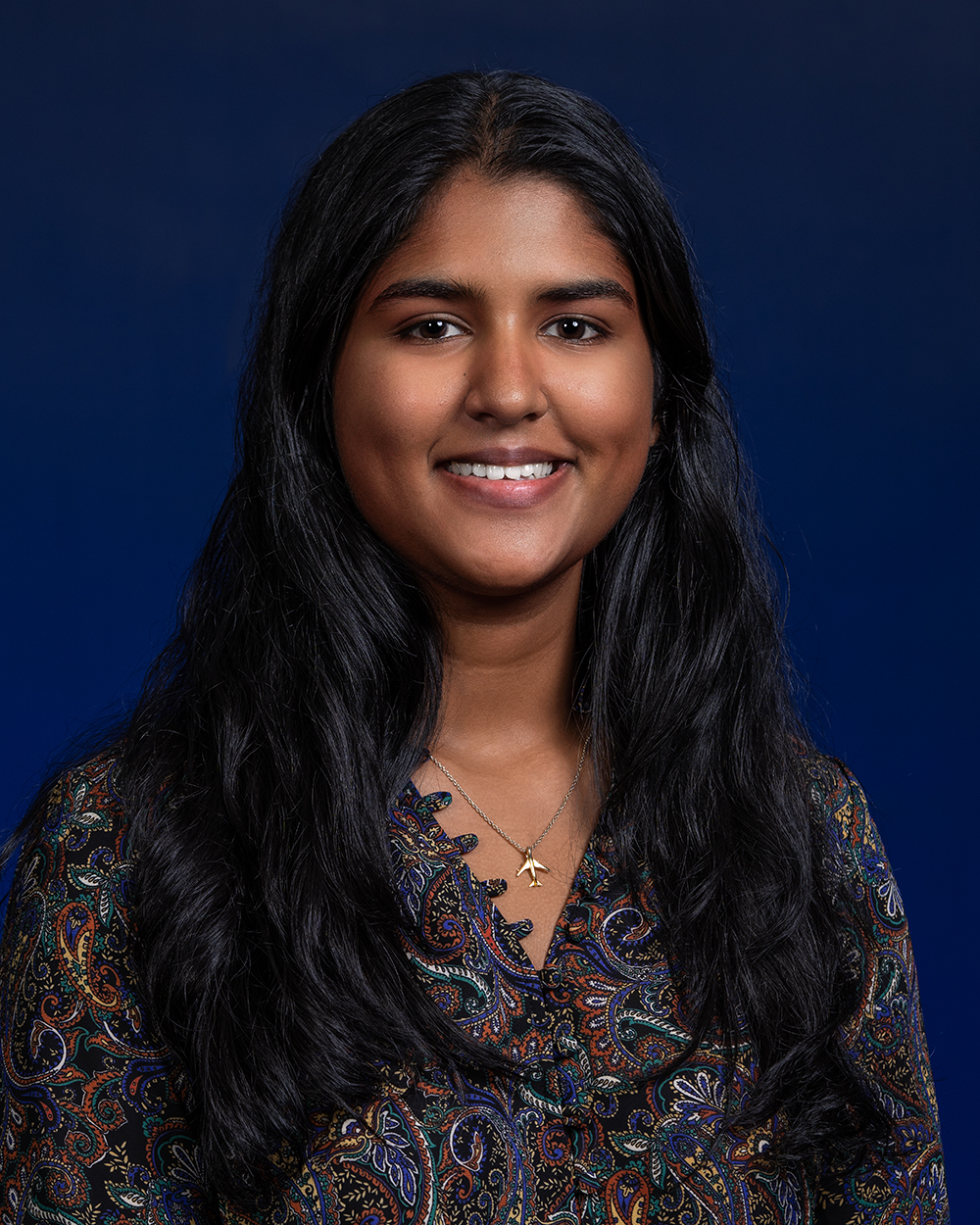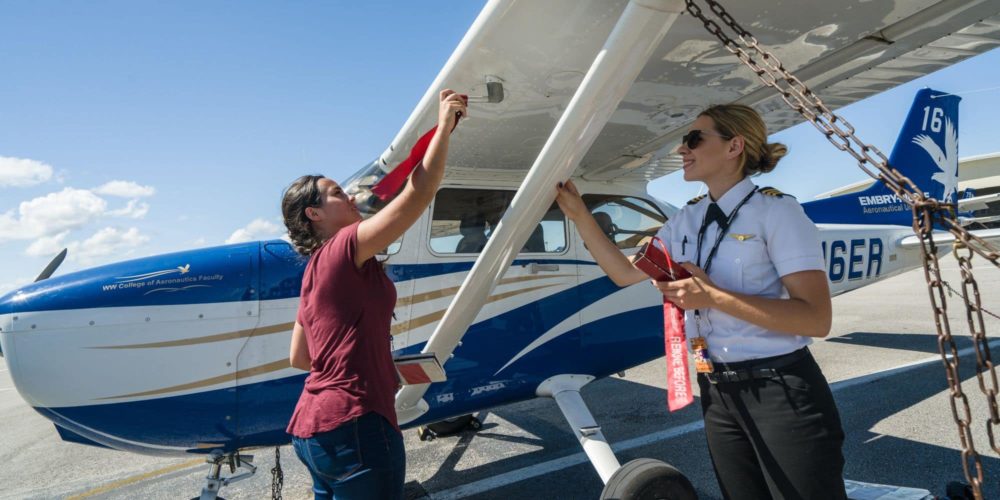Some organizations with the most far-reaching impact start with a small but focused group. That was the case with the Ninety-Nines, founded by women pilots in 1929. What began with 99 charter members is today an international organization that still inspires and advances the education of women entering aviation.
The Embry-Riddle Women’s Giving Circle, launched this summer, shares the Ninety-Nines’ commitment to welcoming talent into a field where women can meet a need for critical skills. Their mission: Create a legacy to address the financial needs of female students and provide young women with role models and mentors who can pave the way to success in the fields of aerospace, aviation and beyond.
This growing group of accomplished women is reaching out to help those who will follow and — given the support they deserve — surpass their achievements. They will award the first scholarships in 2023 to students on the Daytona Beach and Prescott campuses.
Despite gains in other professions, women remain underrepresented on the flight deck, at the launch pad and in the C-suite of aviation and aerospace companies. A 2018 report estimates that only about 4.4 percent of airline pilots are female, with 7 percent certified by the Federal Aviation Administration.
The aviation industry benefits when women gain opportunities to push innovation and boost economic vitality. The Women’s Giving Circle includes alumni, friends and industry experts who want to encourage the success of young women through mentorship, scholarships and industry insight and encouragement.
Each member’s contribution of $100 a month over three years (a total of $3,600) endows a term scholarship for female students with financial need. Founding members of the Women’s Giving Circle include a brigadier general, CEOs, an airline captain and employees of NASA, Northrop Grumman, Aerojet Rocketdyne and Embry-Riddle. Their skills range from engineering and commercial aviation to spaceflight and information technology. Embry-Riddle’s First Lady, Dr. Audrey Butler, chairs the group.
Senior Director of Special Initiatives Jenni Craig says the widening circle invites new members.
“It’s the perfect time to get involved! The founders are drawing on their backgrounds and experience to create momentum and build engagement between members, students, mentors and industry experts. Now we can focus on encouraging and elevating young women when they are making big decisions about their careers.”
Proof of Potential
Embry-Riddle women are leaders in aviation. Notable graduates include Patrice Washington (’82), the first African American pilot of a major airline and astronaut Nicole Stott (’87), who combined scientific duties and artistic creation aboard the International Space Station. Members of the Women’s Giving Circle continue that legacy.
“Nikki” Schwanbeck (’97) is Deputy Manager for Flight at NASA. Dr. Tracy Lamb (’22) is CEO of Quantum AI. And Ana Vegega (’80) is a captain at United Airlines. “It’s been 42 years since I graduated from ERAU, and I have enjoyed a rich career in general aviation, aerospace, and the airline industry,” Vegega says.
“It’s not only my passion, but I believe it’s my responsibility to mentor and assist those who follow. It was an honor to be asked to become a founding member of the ERAU Women’s Giving Circle with the opportunity to advocate for a new generation of women as they chart their own course and work to achieve their goals.”
The Next Generation
One member of the new generation is Angelina Samaroo. On a whim Samaroo took a discovery flight as a teenager that shifted her career aspiration from civil engineer to pilot. She never looked back — but she does look around. As a member of the Flight Line Assimilation Program, she mentors flight students and helps bring diverse crews from regional and larger airlines to the Daytona Beach Campus for hangar talks. This outreach continues her science, technology, engineering and mathematics (STEM) advocacy as a high school student in Niskayuna, New York.
She understands the power of examples and connections. “We gain a lot of honest insight by talking directly to people in the field. As a minority student, I know psychologically that when you are younger, seeing someone in the role you aspire to helps pave your way.”

Vegega was particularly influential for Samaroo: “She is an amazing mentor. She has experience in corporate aviation and the airlines, and I’m still juggling which direction I want to go.” For Samaroo, mentorship takes the form of support as well as advice. “No matter who you are, pilots have a high drop-out rate. Earning your ratings is hard work with lots of highs and lows. Encouragement gets you through those lows.”
Samaroo hopes to inspire and educate other pilots as a certified flight instructor at Embry-Riddle as early as next year. Existing scholarships, like the forthcoming Women’s Giving Circle scholarship, have also helped Samaroo on the path to her bachelor’s degree in Aeronautical Science and her commercial rating. She plans to remain at Embry-Riddle after her December graduation and earn a master’s degree. “I am leaning toward human factors with a focus on safety.”
The Women’s Giving Circle also includes peer mentorship. Through a women’s ambassador mentoring program in the College of Aviation, female students and their families gain a friendly point of contact for questions and concerns. When they arrive on campus, peer mentors help them adjust academically and socially. Monthly mentoring meetings and phone calls with women in aviation keep them in touch with the industry and future employers. Providing personal support to today’s college students allows successful women to acknowledge those who helped them in their careers. Co-founder of the Ninety-Nines Amelia Earhart advised, “Never interrupt someone doing something you said couldn’t be done.”
Almost a hundred years later, the Women’s Giving Circle takes that idea to the next level by ensuring a lack of support does not interrupt success.
